- Home
- Conn Iggulden
Wars of the Roses: Trinity (War of the Roses Book 2) Page 8
Wars of the Roses: Trinity (War of the Roses Book 2) Read online
Page 8
Cromwell’s gaze snapped back, perhaps sensing some of the threat in the dark expressions of the battered group. Salisbury inclined his head in sour greeting.
‘Maud lives, Lord Cromwell. As do my wife and son. As do I. The Percy brigands failed, though they brought three for every one of mine.’
He watched as Cromwell understood, stiffening slightly while his hair waved in the wind like a white flag.
‘Percy?’
Salisbury watched the man’s mouth tighten.
‘It was the dowry manors, then. My lord, I knew their spite, but nothing of their intentions. I swear it on the honour of my house and name.’
‘I hold you innocent, my lord. If I did not, I would not have returned to Tattershall.’
The baron lost some of the tension in his face. Richard Neville was not a man to cross, not with the ear of the Protector. Cromwell wiped his forehead, where it had begun to glisten.
‘For now though,’ Salisbury went on, ‘I must ask that my men are tended in your care, while I send word.’
‘Send word, my lord?’ Cromwell asked. His oyster-eyes were always wet, it seemed, red-rimmed and shining as they darted back and forth amongst those watching him.
‘To Richard of York, baron. The king’s Protector. To my son, Earl Warwick.’ Despite his struggle for calm, Salisbury heard his own voice growing loud and harsh. ‘To every man-at-arms in Neville service in England, to every house bound to us, by blood or marriage. I will call them all, baron. I will cut out the Percy family, root and branch, to be thrown on the fire!’
It would have been courtesy to allow Cromwell to lead them back to his castle, but Salisbury was his superior in rank and, in that moment, beyond such niceties. He dug in his heels and his horse jerked into a trot past the astonished baron, followed on the instant by eighty scarred and scowling men. His son John went with him, staying at his father’s side. Only Maud and Salisbury’s wife, Alice, hung back, the older woman putting her hand out to prevent Maud trotting dutifully after her husband.
‘Baron Cromwell,’ she called, ‘Richard would want me to thank you for allowing us to lodge at Tattershall once more.’ She could not apologize for her husband’s rudeness, so sought words to smooth the older man’s ruffled feathers. ‘You may be sure that your name will be spoken in London as a man we trust and honour.’
Cromwell dipped his head, still bristling as he glared at the rear of the men riding into his home.
‘I’m sure Maud would appreciate your counsel, baron,’ Alice went on. ‘I’ll leave her with you, in your care, where she was always well kept –’
‘Enough, Alice,’ Cromwell said in grim amusement. ‘Your husband charges into my keep without waiting on my permission, but who could blame him after what he has seen? If I were younger, I would be blowing the horns myself after what he has endured. It is forgotten, though you have my thanks for your grace.’
Alice nodded, smiling at a man she liked very much. It was only a shame that Cromwell’s wife had died before producing sons, leaving him to rattle around Tattershall on his own. She dug in her heels and rode after her husband, leaving uncle and niece alone.
‘Your mother-in-law is a fine woman,’ Cromwell said, looking after her. ‘I thank God you came through safely, Maud. If I had known – if I’d heard even a breath of a threat to you …’
‘I know, uncle, you would not have sent me out, even with two hundred Neville guards. Be at peace, I saw very little of the killing. John and Countess Alice took me away before the battle was truly joined.’ As she spoke, the young woman shuddered, goose pimples rising along her arms to give the lie to her words.
‘I gave you to be a Neville, Maud,’ Cromwell said, looking after the soldiers as they rode into his home. ‘Salisbury spoke of houses allied to his and he was not boasting. They run through every line, every house that matters, at least now that mine is joined to them.’ He smiled at his own conceit and was rewarded by dimples appearing in her cheeks before his mood turned serious once more. ‘If there is to be a war, Maud, we have chosen our side by your marriage. I do not envy those who stand against that man, not with Richard Plantagenet on one hand and Earl Warwick on the other. Those three together could break the country in two, were they so minded.’
‘Perhaps it will not come to that, uncle. You told me once that gold begins and ends wars. Perhaps Earl Percy will make recompense for the wounds he has caused.’
Her uncle shook his head.
‘I do not think there is gold enough in the world to prevent the struggle now. I will pray for peace, Maud, but there are times when there is a boil to be pierced, when foul matter must be pressed out to clean the wound. My dear, this may be such a time.’
Thomas Percy strode alone through the corridors of Alnwick Castle. Perhaps the servants avoided the old man when there was bad news on the wind, he did not know. Whatever the reason, the castle seemed empty as he walked, his blood-smeared spurs jingling. He had let his bladder go during the battle, not from fear but simply the impossibility of finding a quiet place to remove his armour while the forces clashed. Four times since then, he’d let hot urine dribble down his leg and out of the open boot-tips as he rode. The inner padding of his armour was drenched with it, chafing the skin on his thighs until it was raw. He could smell the taint strongly on him, though he thanked God his bowels seemed to have blocked. There had been battles where entire troops of mounted knights had come back with brown stains down the flanks of their horses. For all it was a necessary evil, men still bent their wit to sharp comments when they saw such a thing. He would be spared that, at least, when he met his father.
From the marshalling yard, he’d seen Earl Percy standing at the window of the tower library. Thomas climbed the stairs there without seeing a single soul. His mother’s absence was strangest of all and he wondered if his father had sent her away to another of the Percy holdings so she could not witness his return, or demand to know what had happened.
He reached the door and found it slightly ajar, pushing it open with his mailed glove. His father was inside, still standing by the window, staring out. Thomas cleared his throat, feeling a sudden rush of anger that he had to come before the old man in such a way, as if he were a boy sent to be punished after stealing. There had been many such whippings in his childhood, when the man at the window had been younger. Thomas found his heart was thumping in his chest and he imagined how good it would feel to push his father through the leaded glass and watch him break on the ground below. The thought of Trunning’s expression at seeing that almost made him smile as his father turned to him.
‘I sent you out with seven hundred,’ Earl Percy said. The old man’s face was subtly swollen, the web of veins across his cheeks and nose seeming almost black against the brick-red skin. His eyes were sharp as he gathered his furs around his shoulders. ‘I’m surprised you even dared to come home, with so few left at your back. I see from your frightened glances that you have brought me no victory. The men in the yard hang their heads, as they should, if seven hundred cannot butcher a young groom and his servants. Well? Give me the truth of it, boy. I am weary of waiting.’
‘Salisbury had his own guard with him. Two hundred or more of his best men, sixty archers among them. We killed and cut two-thirds of them, more, but Neville escaped, with his son and the Cromwell bride.’
The old man crossed the room in jerky steps, standing to look up at his son in grim appraisal.
‘You come back to Alnwick with nothing? If I had sent your brother Henry, do you think he would be standing there with the same sulky looks, telling me he failed?’
‘I don’t know,’ Thomas snapped, his voice hoarse with rising anger. ‘Salisbury had his best men. They gave a good account of themselves and still we murdered more than half of them before they could get away. I don’t think Henry could have done any more than that!’
His voice had grown louder as he replied and the old man reached out suddenly and smacked him hard across the face. For just
a heartbeat, Thomas flinched, the instincts and memories of childhood overwhelming him. In another moment, he felt rage and shame at his own reaction. He dropped his hand to his sword, suddenly determined to draw and cut his father in two.
Earl Percy’s hand gripped his, a claw that held him still.
‘Oh rule thyself!’ Percy snapped. ‘Control thy choler, you impudent boy! You failed, though you might have won. I knew the risk, when I sent you out. The Neville is cunning and I did not think he would die easily. Yet it was worth the lives you lost to try, do you understand? It was worth the chance I took, with my men and my son, for the gains you might have had.’
Thomas tensed his arm to draw once again. He felt the old man’s strength waver and knew he was stronger, that he could draw and cut if he wanted and there was nothing his father could do to stop it. The knowledge was so surprising, he let his hand fall away.
His father grunted in satisfaction.
‘Master that temper, Thomas, before it masters you. It was ever a Percy failing, though we can bind it well enough.’
Thomas saw a glint of metal amongst his father’s cloaks. His eyes widened at the thought that there had been a dagger there, hidden so quickly he would never be certain. He stepped back and Earl Percy tilted his head, watching him with amusement.
‘I cannot take a step back, Thomas. Not one. You failed, because the Neville is suspicious and wary – and right to be! It doesn’t matter. I planned for this, as well. Your mother is in a convent, bound to holy orders. I asked the Abbess to impose a vow of silence on her, but the old bitch said it was not their way. She will come to regret that, I think!’
To Thomas’s surprise, the old man chuckled and shook his head.
‘Still, it is well that she is away from me, before I killed her, or she took a dagger to me while I slept. Fire and oil, boy, your mother and me, each made worse by the other.’ He saw the confusion in his son and clapped him on the shoulder. ‘Now open your ears. You struck and you missed the heart of the Neville clan. They’ll be coming for us, this year or next spring. Everything I have made, everything I have gathered to the Percy name is in danger now. Yet I would rather go to my grave knowing I had thrown and failed than not dared to throw, do you understand? We will go to war with the Nevilles, with York if we have to, that Plantagenet snake curled up so tight around the king and his son! No Percy weighs the odds, or counts the numbers when we raise banners. I welcome it, Thomas. I welcome the chance to take the field one last time. What good are these old joints to me if I cannot ride against my enemies? When they come, we’ll meet them in King Henry’s name. We’ll stand with a dozen earls and dukes more loyal to King Henry than his damned York Protector, married to a Neville. Do you understand? I gambled to finish it in a day, but one poor throw does not mean the end, Thomas. It means the beginning!’
6
Cold days dropped hard on the country that year. December opened with bitter frosts that froze town and monastery stew ponds, covering fat carp as they lay beneath in darkness, barely moving their fins.
The town of Windsor was luckier than most, with many households able to afford coal, or enough wood to line a wall and keep the families warm. Work went on even in the coldest months, though as the frost deepened, there were soon starving men begging for Christmas alms on every street. With the autumn crops gathered and stored, there were still odd jobs repairing shutters and wooden shingles for those with the skill. Hundreds more drifted in for the royal feasts that would mark the birth of Christ, fourteen hundred and fifty-four years before. In the castle, banquets of two dozen courses were prepared in the knowledge that some of it would be handed out to the poor. It was a tradition around the royal residences, and the best spots on the streets close to the royal kitchens were all taken, though a bad night could reveal one or two frozen bodies in the gutter the following morning.
The gong-farmers, or cesspit men, took on a few labourers in search of work, preferring to dig out the shafts in the wealthier houses while the contents were firm with cold. Those men at least were warm as they descended with rags wrapped around their faces, into the bowels of the earth. Some were always overcome with fumes and had to be pulled out on a rope. It was hard work, but a good pit man could earn a labourer’s weekly wage in a single day.
As Christmas came closer, the roads around the castle filled with those the royal family had invited for the twelve days of peace and celebration. It seemed Queen Margaret was determined not to let her husband’s illness spoil the festivities. Jugglers, magicians and singers competed for coins in the inns, while every room in town had been booked long in advance, until even the stables were filled with snoring families. Acting troupes arrived with raucous fanfares from their own servants, coming into town in elaborate processions, all hoping to perform for the queen. Eclipsing even Easter and Whitsun, Christmas was the greatest festival of the year and Windsor’s busiest time.
With King Henry still lost in his dreaming, there was no public healing planned that Christmas, where those with illnesses would be allowed to come forward and touch his hand. The most desperate sufferers came even so, with nowhere else to turn. Lepers and cripples rang bells on the streets, gathering together for protection as one or two alone could be set upon and beaten by local men.
Those of noble blood rode past the shops and mummers performing for coins, heading for the comforts available in the castle itself. The Duke of York may have been ruling the country in London, yet he could not draw the king’s earls and dukes and barons to a Christmas celebration. The choice of guests in Windsor was the sole province of Queen Margaret and it was no accident that the invitations to forty-four noble houses omitted York, Salisbury and half a dozen others linked to the Neville family. Margaret had considered sending one to Earl Warwick, the younger Richard Neville. She had met him during the siege of London, when Jack Cade brought an army into the city. Warwick had impressed her then, but York’s chancellor was his father and, with regret, she decided that his loyalties were beyond her influence.
One or two guests had sent their regrets, if they were too old or ill to make the journey. Yet over three days, thirty-eight lords and their retinues had come to Windsor, a show of enduring respect for the king that gave Margaret enormous satisfaction. She made a point of coming out to greet those whose support she needed most, honouring them publicly. It was no small thing that she did not make them come to her, and their pleasure showed in flushed cheeks and the proud smiles of their wives.
Derry Brewer made himself invaluable as each household arrived. He wore a simple dark tunic and hose, standing unremarked among the royal staff. He smiled vaguely at everything he saw, but his eyes were sharp and he missed nothing.
From just after dawn, servants in the colours of great houses would come running along the road, announcing their masters and mistresses long before they were in sight. Some would send stewards to prepare the way still further. By the time the heads of noble houses actually rode through the great gates, Derry had delivered a stream of whispered information to the queen’s ear. He carried no ledger, merely tapping his head when Margaret expressed surprise or even blushed at what he knew.
Baron Grey was one she would remember. He had sent no one ahead, arriving up from the town with his rather thin wife on horseback beside him and two fresh-faced lads struggling along in matched tunics, carrying a heavy box. Margaret warmed to the man instinctively, her expression freezing as Derry whispered, ‘Sodomite and pederast, like the Greeks. Fond of his wife, but I’m told he preys on poor lads. Discreet enough. Proud as the devil and about as cruel.’ Margaret glanced at her spymaster as Baron Grey approached. Derry had described a number of peculiarities in the noble guests, from suspicions of an old theft to a broken marriage promise and a ruined girl paid to keep silence. She had heard a tinge of humour in his voice more than once, but no sense of judgement, just a dry recital of old sins and weaknesses. Yet there was something unpleasant in Derry’s eyes as Lord Grey approached. Margaret caught a
glimpse of it before it was shuttered away, something dull and flat and murderous.
Baron Grey bowed deeply to her. His eyes suited his name, rather small and hard in a fleshy, pink face. His wife curtseyed deeply, her entire head hidden by an elaborate bonnet. Words failed Margaret and she only stared, extending her hand to the man. Before that day, she could not honestly have said she knew what a pederast actually was. Derry’s brief description had filled her mind with unpleasant images that made it very hard not to shudder as Grey touched the back of her hand with moist lips. The moment passed and the baron moved on, his wife looking back with thin-lipped pride as they were ushered away. Margaret forced herself to breathe, focusing on Derry saying something about tin mines and an elderly baron bowing like a dancing master, though he was twice her age.
By nightfall, Margaret retired at last, her feet sore from standing. She had rested for brief periods during the day, called away from food or a welcome chair to greet another arrival. She had seen their pleasure that she had done so and, though she was weary, she did not regret the time lost. For the twelve nights following, she would know every man and woman in the castle.
With Derry’s aid, she had been able to place old enemies far apart. She had even ensured the prickly sensibilities of one senior countess were not inflamed by the view of a pretty young cousin as she rose each morning. On Derry’s suggestion, Margaret had made a great fuss of Baron Audley, a white-bearded old soldier who flushed delightedly at her attention. Yet when Baron Clifford arrived, her spymaster grew stern as he leaned close, facing Margaret so that his back was to the man coming towards them both.
‘Give him an inch and he will take it as weakness, my lady,’ Derry muttered. ‘Lord Clifford sees either wolves or deer – nothing in between. Needless to say, he does not respect the deer.’

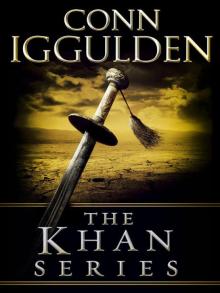 The Khan Series 5-Book Bundle
The Khan Series 5-Book Bundle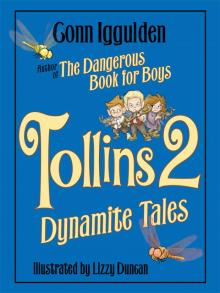 Tollins 2: Dynamite Tales
Tollins 2: Dynamite Tales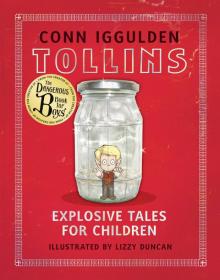 Tollins: Explosive Tales for Children
Tollins: Explosive Tales for Children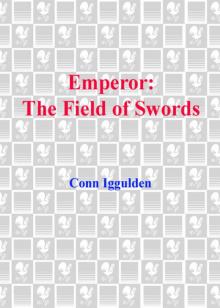 The Field of Swords
The Field of Swords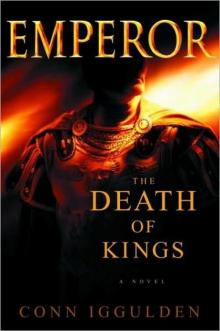 The Death of Kings
The Death of Kings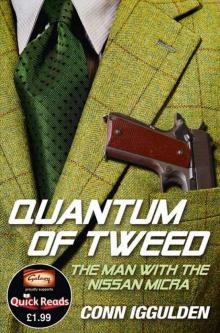 Quantum of Tweed: The Man With the Nissan Micra
Quantum of Tweed: The Man With the Nissan Micra Bones of the Hills
Bones of the Hills Genghis: Birth of an Empire
Genghis: Birth of an Empire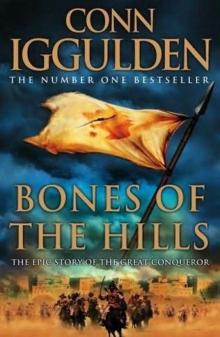 The Gates of Rome
The Gates of Rome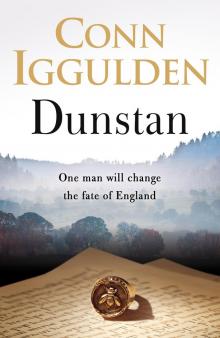 Dunstan
Dunstan Fig Tree
Fig Tree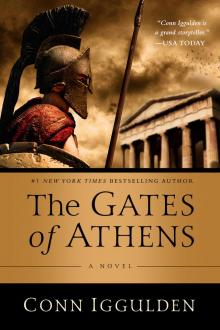 The Gates of Athens
The Gates of Athens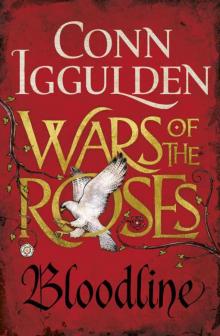 Stormbird
Stormbird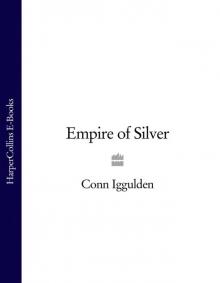 Khan: Empire of Silver
Khan: Empire of Silver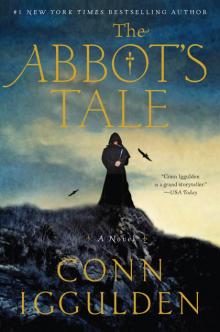 The Abbot's Tale
The Abbot's Tale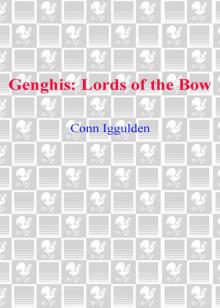 Gengis: Lords of the Bow
Gengis: Lords of the Bow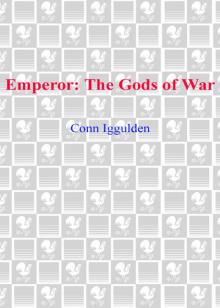 The Gods of War
The Gods of War Blackwater
Blackwater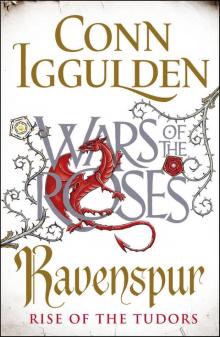 Ravenspur: Rise of the Tudors
Ravenspur: Rise of the Tudors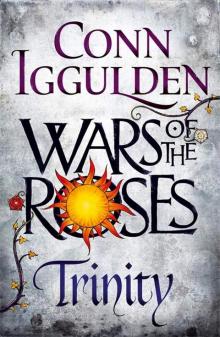 Wars of the Roses: Trinity (War of the Roses Book 2)
Wars of the Roses: Trinity (War of the Roses Book 2) The Gods of war e-4
The Gods of war e-4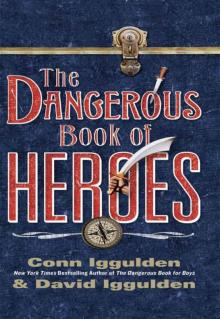 The Dangerous Book of Heroes
The Dangerous Book of Heroes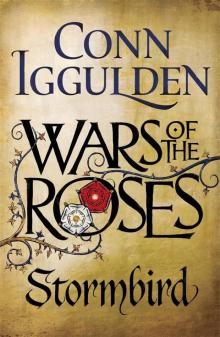 Stormbird wotr-1
Stormbird wotr-1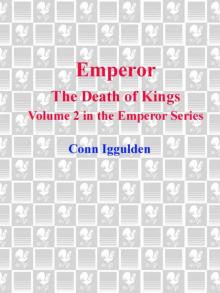 Emperor: The Death of Kings
Emperor: The Death of Kings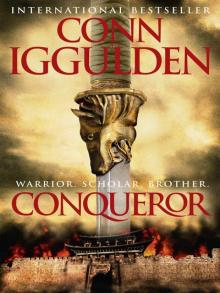 Conqueror (2011) c-5
Conqueror (2011) c-5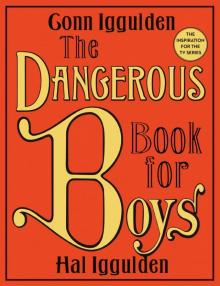 The Dangerous Book for Boys
The Dangerous Book for Boys Genghis Lords of the Bow
Genghis Lords of the Bow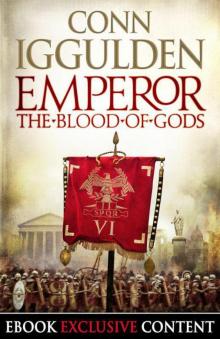 Emperor: The Blood of Gods (Special Edition) (Emperor Series, Book 5)
Emperor: The Blood of Gods (Special Edition) (Emperor Series, Book 5)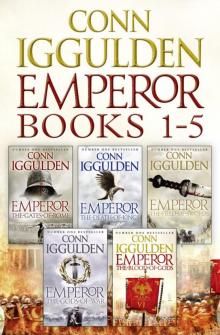 The Emperor Series: Books 1-5
The Emperor Series: Books 1-5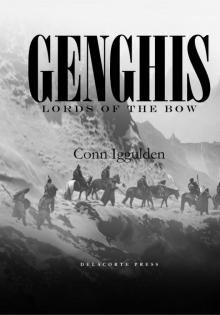 Lords of the Bow c-2
Lords of the Bow c-2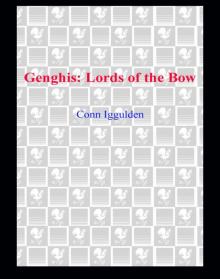 Lords of the Bow
Lords of the Bow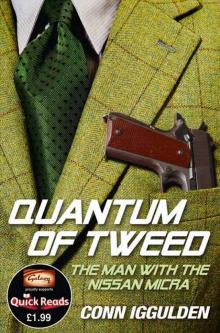 Quantum of Tweed
Quantum of Tweed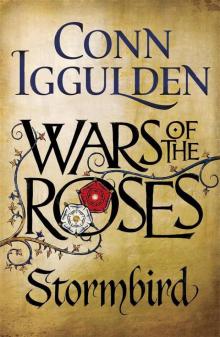 Wars of the Roses 01 - Stormbird
Wars of the Roses 01 - Stormbird Empire of Silver c-4
Empire of Silver c-4 Birth of an Empire
Birth of an Empire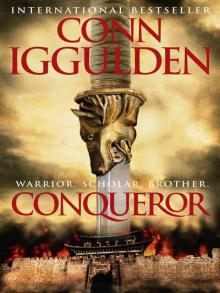 Conqueror (2011)
Conqueror (2011)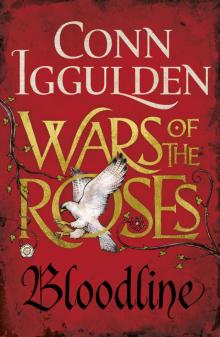 Wars of the Roses: Bloodline: Book 3 (The Wars of the Roses)
Wars of the Roses: Bloodline: Book 3 (The Wars of the Roses) Bones Of the Hills c-3
Bones Of the Hills c-3 Empire of Silver
Empire of Silver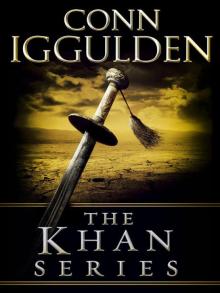 The Khan Series 5-Book Bundle: Genghis: Birth of an Empire, Genghis: Bones of the Hills, Genghis: Lords of the Bow, Khan: Empire of Silver, Conqueror
The Khan Series 5-Book Bundle: Genghis: Birth of an Empire, Genghis: Bones of the Hills, Genghis: Lords of the Bow, Khan: Empire of Silver, Conqueror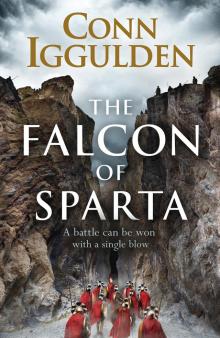 The Falcon of Sparta
The Falcon of Sparta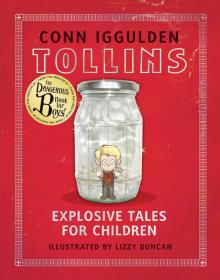 Explosive Tales for Children
Explosive Tales for Children